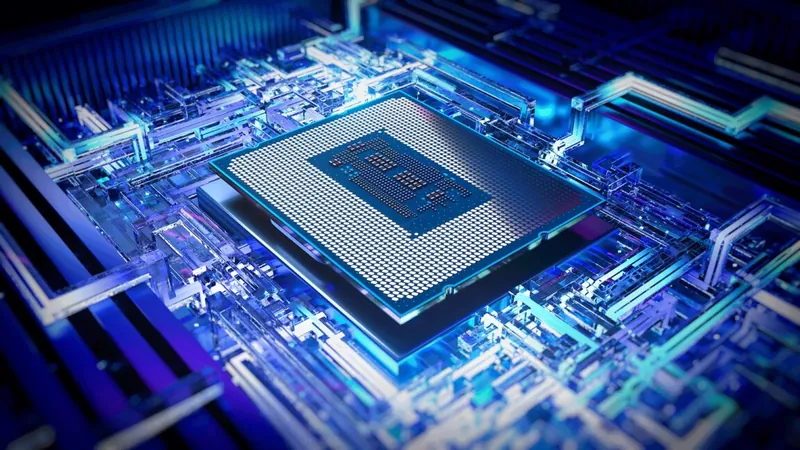
Frustrated Customer Takes a Stand Against Intel Over Alleged CPU Flaws – Could This Lead to Major Changes?
2024-11-07
Author: Chun
Introduction
In a groundbreaking move that could impact millions, a New York man named Mark Vanvalkenburgh has launched a proposed class-action lawsuit against Intel, claiming the tech giant deliberately concealed defects in its 13th- and 14th-generation processors. This bold step could force Intel to pay massive damages for what the plaintiff argues was deceptive marketing that misled consumers into believing they were purchasing top-tier CPUs for the ultimate gaming and streaming experience.
Allegations Against Intel
Vanvalkenburgh’s allegations paint a troubling picture: he asserts that rather than delivering on promises of “amazing experiences” facilitated by these CPUs, users encountered frequent crashes, blue screens, and ominous blackouts—issues that PC Mag suggested might lead to severe hardware damage. He and possibly millions of other disappointed customers contend they had a “reasonable expectation” of reliability based on Intel’s aggressive marketing techniques.
Nature of the Lawsuit
According to the lawsuit, if consumers had known about these defects, they would never have paid the steep prices often associated with Intel’s high-performance products. The lawsuit is targeting anyone who purchased the faulty CPUs across the United States, including a particular focus on consumers in New York who could pursue additional claims.
Intel's Response
Though Intel argues that not all of its 13th and 14th-gen products are defective, the lawsuit casts a wide net, estimating potentially hundreds of thousands, if not millions, of affected buyers. This situation raises the stakes considerably, as Vanvalkenburgh asserts that Intel was aware of these defects as early as late 2022 or early 2023, having noted a “significantly high” return rate shortly after the release of their 13th-generation processors.
Key Complaint Details
Vanvalkenburgh’s complaint hinges on the allegation that Intel failed to disclose crucial information about the CPUs, knowing full well that the defect was “material.” He contends that internal testing, typically conducted before product launches, should have revealed these issues, which Intel chose to keep hidden, instead opting to promote the CPUs as superior offerings in the market.
Industry Insight
In a dramatic twist, data from industry sources like Tom's Hardware indicates that the return rates for Intel’s Raptor Lake processors are significantly higher than previous generations—four times greater than their predecessors, and even three times higher for the subsequent 14th generation chips. This raises eyebrows not only at consumer forums but also within the tech industry, as many are left wondering how the company will respond.
Consumer Reactions
Consumers have expressed immense frustration and uncertainty in various online communities, with many stating that the ongoing worry of system crashes leaves them in a “permanent state of anxiety.” Some have noted that Intel's response to the situation has been inadequate at best, criticizing the company for only extending its warranty without fully addressing the underlying issues.
Potential Implications
The potential implications of this legal action are extensive. If the class action is approved, Intel could face profound financial repercussions, possibly in the hundreds of millions of dollars. Vanvalkenburgh is seeking not just compensatory damages but also punitive measures to prevent future misconduct, aiming to hold Intel accountable for what he describes as “malicious and oppressive” practices aimed at financial gain at the expense of consumer trust.
Conclusion
As the case unfolds, many are left wondering: will this lawsuit force a shift in how major tech companies are held accountable for their products and practices? As consumers anxiously await further developments, it remains to be seen how Intel will address the allegations and whether they will take steps to regain the trust of their customer base.


 Brasil (PT)
Brasil (PT)
 Canada (EN)
Canada (EN)
 Chile (ES)
Chile (ES)
 España (ES)
España (ES)
 France (FR)
France (FR)
 Hong Kong (EN)
Hong Kong (EN)
 Italia (IT)
Italia (IT)
 日本 (JA)
日本 (JA)
 Magyarország (HU)
Magyarország (HU)
 Norge (NO)
Norge (NO)
 Polska (PL)
Polska (PL)
 Schweiz (DE)
Schweiz (DE)
 Singapore (EN)
Singapore (EN)
 Sverige (SV)
Sverige (SV)
 Suomi (FI)
Suomi (FI)
 Türkiye (TR)
Türkiye (TR)